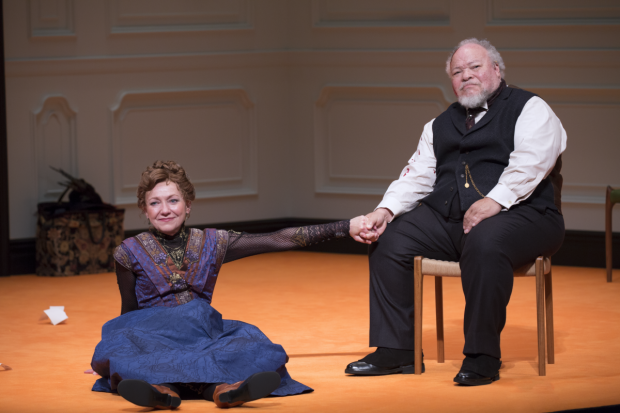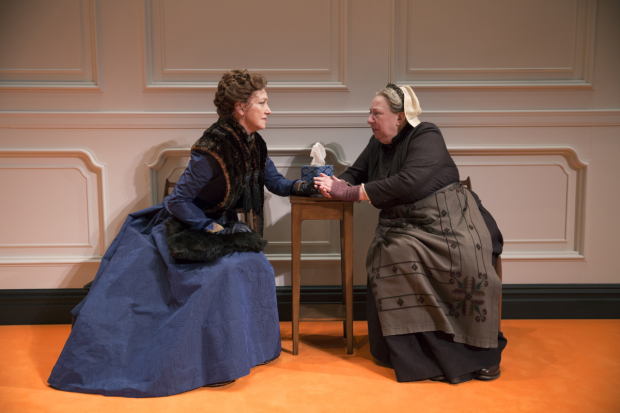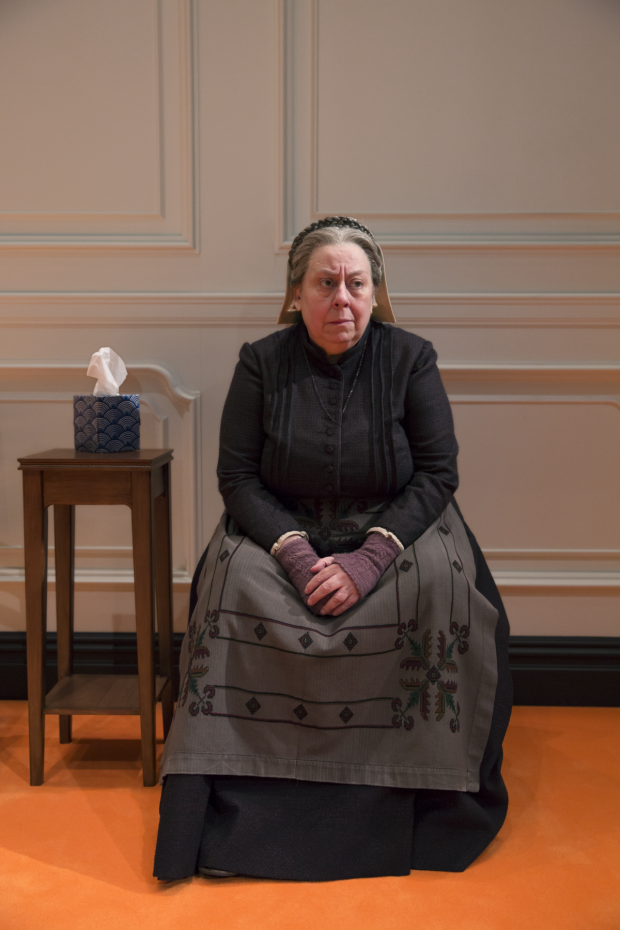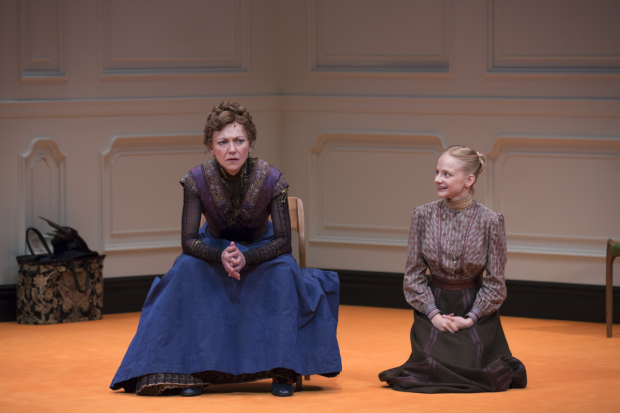
(© Julieta Cervantes)
"If you want to keep your marriage, you learn to live lies," the late musical theater legend Barbara Cook observed in a recent interview with TheaterMania. The lights of Broadway dimmed last night in Cook's honor, but inside Broadway's John Golden Theatre, someone was about to have a lightbulb moment about the drift of dishonesty that comes with long-term relationships: We should abolish marriage. That's the radical message of that evangelist of individuality, Nora Helmer, protagonist of Lucas Hnath's A Doll's House, Part 2, which has just replaced 75 percent of its cast while maintaining its rightful reputation as the most thought-provoking new play on Broadway.

(© Julieta Cervantes)
This completely unauthorized sequel to A Doll's House picks up Henrik Ibsen's story 15 years after Nora left her husband, Torvald, an act that shocked 19th-century audiences. Since then, Nora (Julie White) has become a successful author, advising women to do as she did and liberate themselves from the bonds of domesticity. She would never have come back to her old home, but she has recently learned that Torvald (Stephen McKinley Henderson) didn't actually file for divorce. This is a problem because Nora has been living as a single woman all these years, sleeping with other men and signing publishing contracts without the consent of her husband (an action tantamount to fraud in this sexist society). If anyone found out, she could be prosecuted and sent to jail. Making matters worse, a powerful judge whose wife left him after reading one of Nora's books is threatening to reveal her secret.
Nora first reaches out to trusted family nanny, Anne Marie (Jayne Houdyshell). When Anne Marie realizes what Nora really wants from this reunion, she recommends Nora talk to her estranged daughter, Emmy (Erin Wilhelmi), who still has Torvald's ear. But is Emmy even interested in seeing the woman who abandoned her as a toddler?
The strength of Hnath's drama is in its ability to get us to sympathize with all four of his characters, a power very much amplified by the excellent performances of this cast. Henderson is especially persuasive as Torvald, a man still smarting from wounded pride. "I should have left you long before you left me," he tells Nora, his mouth drooped like a depressed shar-pei. It's hard not to feel bad for him, even after he betrays the fact that he hasn't really changed or grown since the first play: His unhappiness is still completely tied to the way others perceive him.
Wilhelmi's Emma has inherited her mother's smile and unflappable penchant for selling a crazy scheme like it was the best idea in the world. Her innocent look conceals the fact that she may just be the most cunning character in the play.

(© Julieta Cervantes)
As the only holdover from the original cast, Houdyshell's performance has grown more delicious and hilarious with age. She has perfected Anne Marie's sour glower, which wouldn't look out of place in a Grant Wood painting. Her harried demeanor tells the story of a woman who has sacrificed her physical and mental health to her bourgeois employers and now just wants a little peace and quiet in her remaining years.
Of course, Nora isn't going to give her that. Julie White is as indefatigable as her character, always angling for what she wants with a new tactic and a conspiratorial smile. When another character tries to trap her with a question she cannot answer, she briskly dances out of the point and onto another. When all else fails, she takes her case directly to the people. Speaking about the depressing prospect of committing to one person until death, she comments, "We know it's sad — we know it," pointing her two fingers right at the mezzanine as if she were Suze Orman, about to sell a ton of books.

(© Julieta Cervantes)
Director Sam Gold stages several such moments directly downstage, embracing the polemical nature of Hnath's play. His characters are like combatants in a debate, scoring points by shifting audience sympathy to their side. Detractors will call A Doll's House, Part 2 contrived, but when the subjects are this compelling, why seek to hide them in a dramatic haystack? Hnath tackles not only persistent misogyny, but the cult of individualism, the compromises we all make for comfort, and the faith required to make a change. Different segments of the audience cheer and gasp at different lines, promising a heated discussion that will spill out into the street after the curtain call. You should really get in on it.








